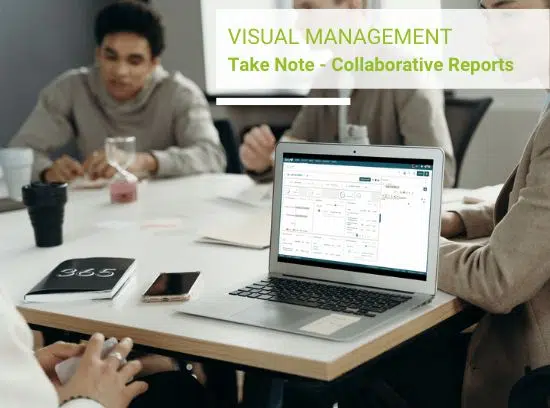Create or update your meeting notes, directly from your activity tracking Reports At the same time as you track your...

“Over the past 30 years, humanity has produced more information than in 2,000 years of history and this volume of information doubles every 4 years.” P. Aron and C. Small
Today companies all felt the excess of information. Every day we are a little more flooded by the mass of information, also called “infobesity” or “junk information”: emails, instant messaging, meetings, Internet…
Unintentionally, we accumulate astronomical amounts of information more or less useful on a daily basis. In the end, our brain is constantly stimulated and overwhelmed by the weight of information and this can have more or less serious consequences for our health and well-being: less creativity, reduced efficiency at work, decreased concentration, accumulation of stress…
According to a Canadian survey, 28% of European workers are so stressed at work that they are close to burnout.
How can we be able to sort out the “good” information from the “useless” information when we are drowned in the mass of information and more than 25% of a working day is devoted to searching for information. The paradox being that the individual is confronted every day with an omnipresence of information that is sometimes useless.
Nowadays, 74% of managers say they suffer from information overload and 94% of them think that the situation will not improve, according to Caroline Sauvajol-Rialland.

Junk information can effectively reduce the productivity of employees and therefore the company through 3 elements:
Being constantly in the information emergency entails a psychosocial risk for the individual (stress, depression, fear of going to work, anxiety). People feel trapped by this information overload to manage. Moreover, a feeling of inefficiency, guilt, incapacity (even weakness) is added to his uneasiness.
This syndrome can therefore be summed up as an accumulation of stress linked to over-information: for 40% of employees, the simple fact of receiving emails generates stress. The problem is that according to an Adobe study, 64% of French people check their business emails on holiday, 62% in front of the TV and 42% in their bed.

4 out of 10 employees say they are “overworked” and 56% of them feel an increase in the volume of work (source: Caroline Sauvajol-Rialland).
According to a study commissioned by Hewlett-Packard, we are becoming less intelligent because of the excess information that our brains can no longer manage. This is due to the fact that the volume of information received by a manager is 10 times higher than it was 15 years ago (according to a OnePoll study).
Another study has shown that being in a situation where you focus on a task and an email is not read in your mailbox can reduce your effective IQ by 10 points. This has shown that the cognitive losses due to this digital multitasking are even stronger than the effects of cannabis use.
The idea is to use all this information in an intelligent way by setting up an adapted and well-reasoned collective communication system: i.e. by reducing collaborative overload. In companies it is necessary to know how to select and prioritize information.
For instance, well-reasoned communication is communication that gives meaning to work and restores a sense of pride in belonging to the company and to the profession.
Some examples to simplify this collaborative overload:

This method allows to obtain a synthetic view of the organizational state of information and to no longer waste time on information less essential for the company’s activity. The Eisenhower matrix provides a clear vision of the tasks to be delegated, deleted or simply carried out in order of importance and urgency. Time is optimized and stops the anxiety of endless To-Do lists.
First of all, you should try to reduce the sources of information by structuring, cutting, organizing and sharing those that are relevant and useful for your activity in a single tool. It is important to define the clear objectives you want to achieve for the success of your business and then accept the idea that you cannot see and process everything on your own.
Centralizing information means above all knowing how to empower your collaborators and give them autonomy. For example, you can integrate a solution that emphasizes collaborative work in the company to increase productivity by 20 to 25%: all collaborators are included in the process and are kept informed of the progress of the various projects; information is shared in the solution and everything is updated in real time.
As a manager, your role is to become a real support for your employees, relieve the pressure and less control to be able to delegate tasks to them. The objective is to get rid of what is less important to you and to accept the risk of trusting your collaborators.
62% of French employees express a strong expectation regarding the regulation of the use of digital tools – of a collaborative type – and even more of them are demanding this type of regulation among managers with 75% (according to an Eleas survey “Digital Practices in 2016”).
These figures reflect the informational urgency in which we live every day and the importance of knowing how to equip ourselves with the right tool to deal with it.
To go further, read the articles on The importance of having a good tool to manage your activity.
Discover beesy, the all-in-one solution that will meet your expectations:
…and much more! Project management will no longer hold any secrets for you.
1 month free trial!
Participative Management is a concept that emphasizes the involvement and participation of the team in decision making and problem solving. This approach aims to strengthen the motivation of employees, improve their commitment and encourage innovation and creativity...
At BeesApps, our goal is to provide companies with complete and fully customizable management tools to facilitate activity monitoring and increase team efficiency. This month, we are pleased to present a series of new features in the dashboard to facilitate the...
Every year, collaborative overload increases exponentially. It's getting harder to stay on top of all your tasks while not get overwhelmed by unecessary activities collaboration-related. The COVID-19 pandemic has accelerated the development of home working and the use...